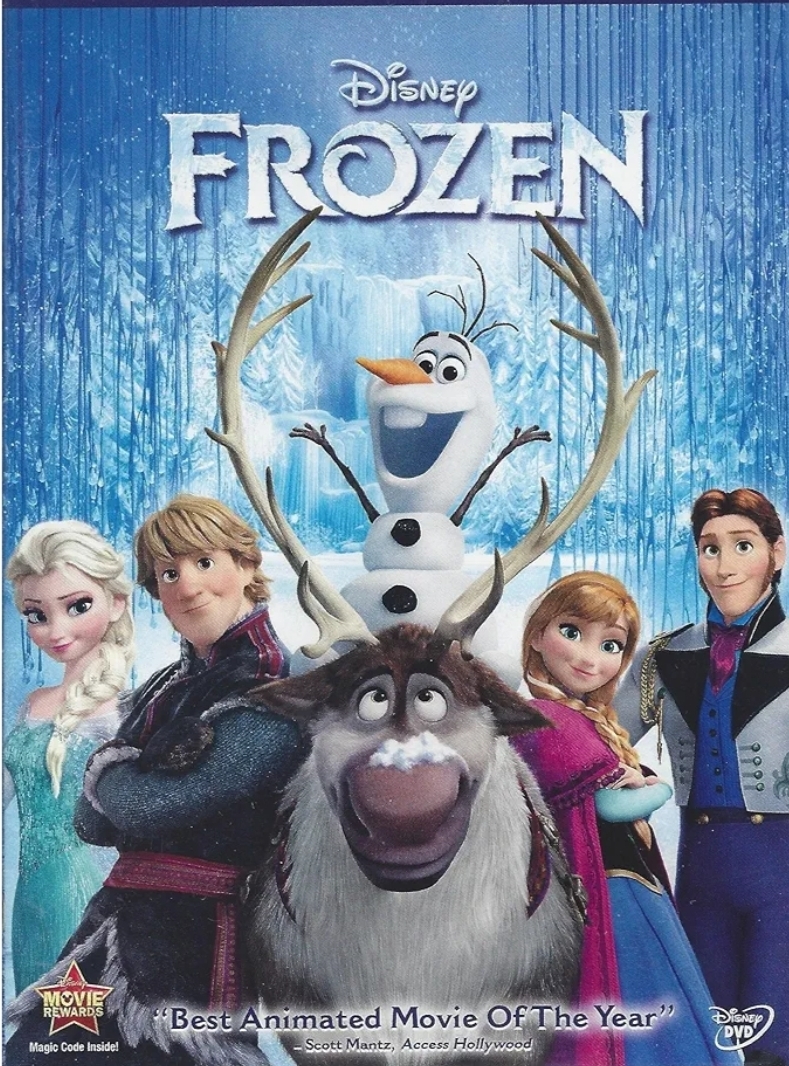Core Question: How do we order authentic self-expression so it serves, rather than harms, those we love?
Tagline (spirit): “Power without virtue isolates; power ordered by Agápē liberates.”
What is Agápē?
In classical Greek, there are four common words for “love”:
- Agápē — sacrificial, unconditional love; wills the good of the other, even at personal cost.
- Érōs — romantic/erotic desire; attraction and longing.
- Philia — friendship/affection; comradeship shaped by shared virtue.
- Storgē — familial love; natural affection within family bonds.
Why Agápē fits Frozen
- The miracle is self-gift, not romance
The film’s “act of true love” is Anna’s self-sacrifice for Elsa—not a kiss. That re-centers the story away from érōs and onto agápē: love that gives itself to protect the beloved’s life, even when it costs everything. - Fear isolates; agápē integrates
Elsa’s power becomes destructive under fear and secrecy (gloves, closed doors). Only when love is chosen over fear does her gift serve the common good (she thaws Arendelle and playfully orders winter). Agápē rightly orders gifts toward others. - Sisterhood > spectacle
Anna’s pursuit isn’t for status or approval; she wills Elsa’s good when it’s inconvenient, humiliating, and dangerous. That’s agápē’s signature: steadfast presence rather than performative rescue. - A critique of counterfeit loves
- Hans embodies manipulative érōs—love as power and image.
- Kristoff models maturing love: attraction tempered by selfless action (returning Anna to Hans when he thinks it’s best for her). Romance is redeemed when infused with agápē.
- Truthful love over protective lies
The royal strategy—“conceal, don’t feel”—is a fear-driven storgē that harms. Real care tells the truth, invites consent, and risks vulnerability. Agápē loves the person as an end, not as a problem to manage. - From control to communion
Arendelle’s thaw is moral as well as meteorological: doors open, queenship becomes service, and community replaces isolation. That’s agápē moving from private affection to public vocation.
Symbols that point to Agápē in Frozen
- The closed doors → opened gates: isolation → welcome.
- Gloves → bare hands: control → authentic presence.
- Frozen heart → thaw: fear’s damage healed by self-gift.
- “Act of true love” → self-sacrifice: redefinition of love’s highest form.
Quick takeaway
Frozen argues that the love strong enough to save a life—and a kingdom—is agápē: not a rush of feeling, but a deliberate, costly willing of the other’s good. When that love leads, érōs becomes honorable, philia deepens, storgē matures—and winter finally learns how to serve summer.
Doors, Fear, and the Miseducation of the Heart
Moral Core: Safety vs. love; concealment vs. truthful relationship
Young Elsa is taught to fear her gift after accidentally injuring Anna. The family adopts a policy: “conceal, don’t feel.” Doors shut. Gloves on. Emotions become threats; love becomes dangerous. After the parents’ deaths, isolation calcifies into identity.
Lessons
- Fear-based rules protect in crisis but deform when made permanent.
- Suppression is not formation; self-mastery needs truth, not denial.
- Doors meant for safety can become prisons.
Philosophical Frame
- Virtue ethics: Temperance is right ordering of passion, not numbness.
- Attachment theory: Secure love teaches regulation; shame teaches hiding.
Coronation, Masks, and the Temptation of “Let It Go”
Moral Core: Authenticity vs. responsibility
At the coronation, Elsa’s loss of control exposes her powers; she flees to the mountain and sings “Let It Go”—a cathartic but incomplete manifesto: freedom from fear, yet freedom from duty too. She builds an ice palace (a beautiful exile). Meanwhile Anna impulsively accepts Hans’s proposal—mistaking intensity for intimacy.
Lessons
- Authenticity without Agápē can become harm dressed as honesty.
- Aesthetic freedom (“no right, no wrong, no rules for me”) is immature if it ignores others’ good.
- Romantic érōs (Anna–Hans) is not proof of character.
Philosophical Frame
- Existentialism (corrected): Be true to the self and to the good.
- Prudence: Freedom must be yoked to foresight and care for consequences.
Confrontation on the Mountain: Truth, Limits, and the Sister-Wound
Moral Core: Good intentions do not cancel real effects
Anna confronts Elsa; fear spikes; a second accident strikes Anna’s heart. Grand Pabbie’s counsel: “Only an act of true love can thaw a frozen heart.” Everyone assumes “true love’s kiss”—a category mistake. Hans’s mask soon drops; his love is calculus.
Lessons
- You are responsible for the effects of your gifts, not just your motives.
- Communities often ritualize shortcuts (a kiss) instead of costly love.
- Deception parasitizes trust: villains weaponize our thirst to belong.
Philosophical Frame
- Kantian respect: Do not instrumentalize persons (Hans’s strategy fails this).
- Personalism: Love wills the other’s good, not one’s narrative.
Betrayal, Blizzard, and the Ethics of Sacrifice
Moral Core: Agápē reorders power
Hans leaves Anna to die; Elsa, captured, despairs—her storm becomes tyranny by accident. Kristoff races back, but Anna, seeing Hans about to kill Elsa, chooses her sister over her own rescue. She steps between blade and beloved; she freezes—then thaws. Act of true love accomplished.
Lessons
- Agápē (sacrificial, unconditional love) is the cure to fear’s spiral.
- Love is not sentiment but self-gift under cost.
- Courage is choosing another’s life over your ideal ending.
Philosophical Frame
- Agápē vs. Érōs: The story critiques eros-idolatry; crowns agápē as the highest love.
- Moral psychology: From impulse to principled action under risk.
Thaw: Ordering Gift to the Common Good
Moral Core: Vocation over validation; relationship over image
Anna’s sacrifice teaches Elsa how to aim power: not away from feeling, not against people, but for people. Love becomes the regulator—ice obeys when the heart is rightly ordered. Doors open. Skates on the fjord replace spikes through the city.
Lessons
- Gifts find their telos in service; love is the governor of power.
- Belonging precedes behaving: safety to feel → capacity to master.
- Governance (Elsa) and friendship (Anna/Kristoff/Olaf) become communities of truth.
Philosophical Frame
- Eudaimonia: Flourishing is excellence in relationship.
- Civic virtue: Rulers owe stewardship; subjects owe truthful loyalty.
Symbols & What They Mean
| Symbol | Meaning |
|---|---|
| Gloves/Closed doors | Shame-based control; protection turned prison |
| Ice/Blizzard | Fear externalized; power without love becomes hostile climate |
| Ice palace | Aesthetic autonomy without responsibility; splendid isolation |
| Summer/Thaw | Power integrated by love; ordered affections |
| Anna’s frozen heart | Consequences of mis-aimed love/fear; need for agápē |
| Olaf | Childlike philia; comic truth about love (“Some people are worth melting for”) |
| Hans’s sword | Instrumentalization of persons; the calculus of power |
Core Themes (with Real-World Applications)
Authenticity Ordered by Love
Lesson: “Be yourself” must answer “for whom?” and “to what end?”
Apply: Pair bold expression with impact reviews—ask who is affected and how.
Fear vs. Formation
Lesson: Hiding is not healing; rules must evolve from crisis to growth.
Apply: Replace permanent “no” rules with staged training, feedback, and trust.
Discernment in Love
Lesson: Intensity ≠ integrity; test characters, not chemistry.
Apply: In teams/relationships, privilege pattern over promise.
Power as Vocation
Lesson: Gifts are for the common good; love is the constraint that frees.
Apply: Create “gift charters” that specify how strengths must serve people.
Sacrifice Rewrites the Story
Lesson: Agápē reinterprets past harm and unlocks futures fear could not.
Apply: Identify one costly, concrete good you’ll do for your “Elsa/Anna.”
Character Arcs (as Moral Progress)
| Character | Starting Constraint | Transforming Moment | New Virtue |
|---|---|---|---|
| Elsa | Shame-fueled control; fear of self | Learns love regulates power after Anna’s sacrifice | Temperance, prudence, servant-leadership |
| Anna | Impulsive optimism; eros-naïveté | Self-sacrifice to save Elsa | Courage, agápē, wise hope |
| Kristoff | Self-reliant outsider | Returns for Anna without guarantees | Fidelity, humility |
| Olaf | Childlike innocence | Willingness to melt for Anna | Cheerful charity (philia → agápē) |
| Hans | Charming opportunism | Exposed when power is within reach | (Negative) Machiavellianism unmasked |
Moral Psychology (Kohlberg Mapping)
- Stage 2 (Self-interest): Anna’s impulsive engagement; Elsa’s flight to personal freedom.
- Stage 3 (Approval): Masks/manners at coronation; appearing “proper.”
- Stage 4 (Law/Order): Duty to the realm—yet brittle without love.
- Stage 5 (Social Contract): Reassessing rules for the people’s good.
- Stage 6 (Principle): Anna’s sacrificial interposition; Elsa’s love-ordered governance.
A Practical “Frozen” Checklist (for people, orgs, communities)
- Glove Audit: Where are you suppressing truth instead of forming it? Replace shame protocols with training and transparency.
- Impact Map: For every “Let it go” decision, document stakeholders and mitigations.
- Love Tests Lust: Before major commitments, test character over chemistry (references, patterns, service under stress).
- Gift Charter: Write how your strongest talents must serve others—include red lines (no use in anger, secrecy, or vanity).
- Act of True Love: Define one costly, specific action this month that privileges a person over your preference.
Final Reflection
Frozen is not a hymn to unchecked self-expression; it’s a parable about the ordering of power by Agápē. “Let It Go” cracks the door from shame to honesty, but only Anna’s sacrifice and Elsa’s re-aimed love complete the journey. The moral center is simple and demanding: authenticity becomes freedom only when it is bound to the good of the beloved—when doors open, gloves come off, and gifts serve a thawed, flourishing community.







